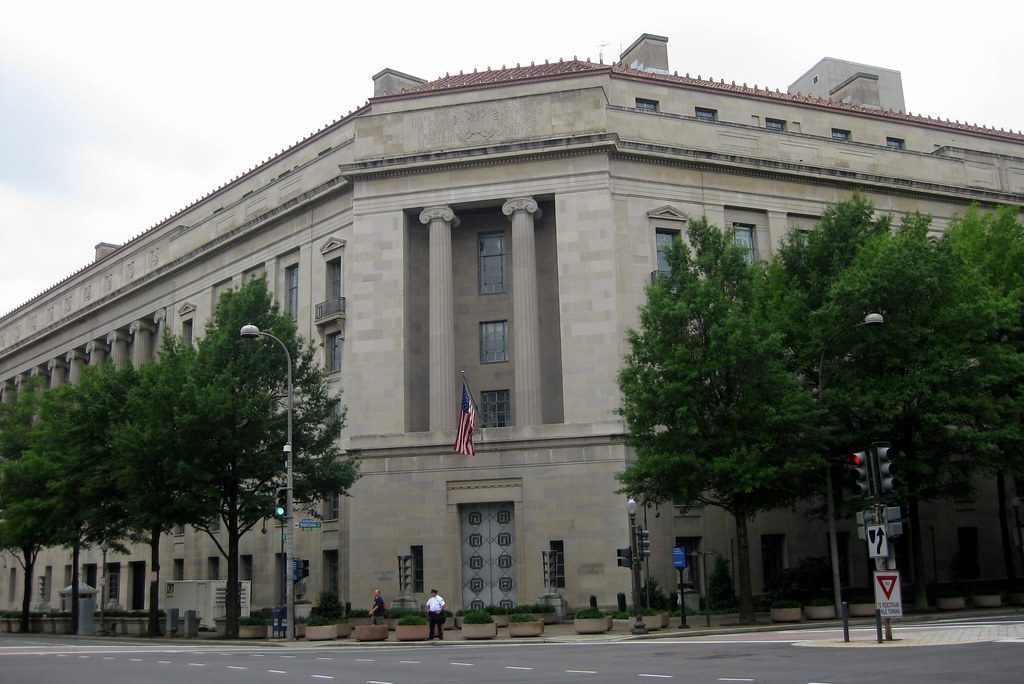Here at the Revolving Door Project, we’ve been very loud about the damaging impact of BigLaw on the executive branch and the myth of corporate BigLaw attorneys as neutral arbiters of laws involving their own clients and bottom lines. Recent revelations about former Assistant Attorney General Jeffrey Bossert Clark and his role in the attempts to undermine the 2020 election have further underscored the absurdity of these arguments, calling into question the continued influence of corporate BigLaw in the Biden Administration.
Jeffrey Bossert Clark (it apparently was very important to him that his middle name was on every brief) served as the Assistant Attorney General for the Environmental and Natural Resources Division of the Department of Justice from 2018 to 2020 before hopping over to DOJ Civil and participating in some light treason. As Slate reported this month, Clark’s resume “looked much like that of countless conservative lawyers,” working for the BigLaw firm Kirkland & Ellis, teaching at the conservative George Mason School of Law, and participating in seven years worth of Federalist Society events. The warning signs for Clark were there early: he represented BP in lawsuits about their infamous oil spill, challenged the federal government’s authority to regulate carbon emissions, and questioned when the U.S. agreed to be ruled by “foreign scientists and apparatchiks at the United Nations.” Just your classic environmental appointee!
Like several Obama appointees and a frontrunner for a Biden appointment (she did not get a job subject to confirmation), Trump-appointee Clark came from the BigLaw firm Kirkland & Ellis. As you can see in RDP and the People’s Parity Project’s BigLaw Revolving Door Report, Kirkland & Ellis has represented companies including Raytheon, BP, and Facebook, as well as more than 450 clients in their private equity practice. Oh, and the infamous human trafficker Jeffrey Epstein. In his initial appointment as head of the Environmental and Natural Resources Division at the DOJ, Clark’s notable “accomplishments” included holding up Clean Water Act enforcement cases, working to weaken the Mercury and Air Toxics Standards, and ending the DOJ’s use of Supplemental Environmental Projects, a tool to promote environmental justice.
In September 2020, Clark was named Acting head of the Civil Division, where he quickly made his mark by inserting the federal government into the defamation lawsuit against President Trump by E. Jean Carroll and suing First Lady Melania Trump’s close friend and aide who wrote a “tell-all” book about her time in the White House. In December, Clark’s actions took an even darker turn when he started advocating for the Justice Department to sign onto a letter casting doubt on the 2020 election results in Georgia and five other states, met secretly with President Trump to have unauthorized conversations about publicly casting doubts on the election results, and at one point asked his superiors to look into “foreign election interference issues,” including alleging that Chinese smart thermostats hacked voting machines.
If Clark’s record sounds absurd, it is, but arguably the most disturbing part is that so many legal thinkers maintain that all but the most recent additions to it are beyond reproach. And despite all that BigLaw attorneys like Clark did over the last four years, that thinking is alive and well in the Biden era. Take, for example, the saga of Alex Oh, a corporate attorney who defended literal human rights abuses against Indonesian villagers — as in, allowing guards in their employ to commit murder, kidnappings, and rape against the local communities. Oh, who was inexplicably nominated by the Biden Administration to be the Director of Enforcement at the SEC, also defended big banks and Wall Street firms in litigation stemming from their fraudulent sales of mortgage-backed securities (one of the main products which led to the 2008 financial crisis). We immediately condemned the nomination and questioned how Oh could possibly work in the public interest after decades of defending Exxon Mobil, Bank of America, UBS, and Merck. Oh stepped down mere days after taking the SEC job, and the BigLaw defense machine was quick to jump into action. One BigLaw attorney called Oh’s resignation “Twitter mob purity butting up against the time-honored tradition of zealous advocacy.” Criticizing a BigLaw attorney for decades of helping the worst corporations avoid government regulation, and then attempting to enter the government, truly shouldn’t be this controversial.
And the idea that BigLaw attorneys making hundreds of thousands of dollars a year are not responsible for their clients or the heinous arguments they make isn’t just limited to those who exclusively work in the private sector. In an op-ed from December 2020, former Attorney General and current BigLaw partner Eric Holder defended former Solicitor General Neal Katyal for his own “zealous advocacy” on behalf of the Nestle company’s use of child labor. Child labor! A former Solicitor General, with the status and standing that position carries, has wide-ranging power over what type of work he does and cases he takes. Choosing to defend child labor is most assuredly not the best use of that power. His defender, Eric Holder, represented Chiquita in a deal with the Justice Department for paying a terrorist organization $1.7 million prior to heading the entire Department during the Obama Administration. This underscores how much of a bipartisan and prevalent problem BigLaw has become.
The lesson we should take from Jeffrey Clark’s attempts to undermine democracy and overthrow the 2020 election is that intense scrutiny of executive branch appointees is not only justified but necessary. If Jeffrey Clark, a “standard Republican lawyer political appointee” can end up driving forward what is essentially a coup attempt, it is time to reevaluate the supposed neutrality of BigLaw attorneys and ensure anyone in the executive branch will actually act in the public interest. The Department of Justice should investigate all Trump appointees, even those with elite backgrounds, to fully recognize and address the threat from within.
“Washington DC – Federal Triangle: Robert F. Kennedy Department of Justice Building” by wallyg is licensed under CC BY-NC-ND 2.0

